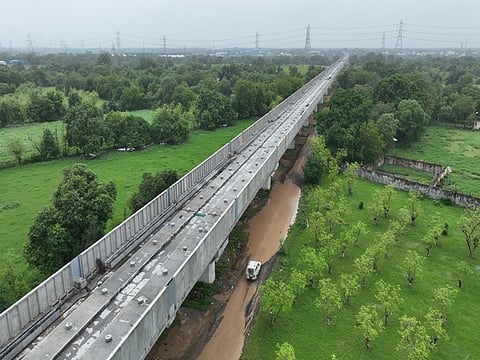

NEW DELHI: The high-speed rail corridor, being developed between Mumbai and Ahmedabad for running India’s first bullet train at a speed of 260-300 kmph, is getting ready to mitigate noise impact on residential colonies located along the tracks, officials said.
The Railways is installing advanced ‘noise barriers’, also called ‘sound walls’, along the bullet train route on a mission mode to reduce noise levels when the bullet trains will start running by 2026, a senior railway official said.
“These measures are designed to ensure that the introduction of high-speed bullet trains does not disrupt the peace of communities living in proximity. The move reflects a commitment of the Indian Railways to balance modern transportation advancements with the well-being of local population. Bullet trains produce high noise when it runs in full speed. The ‘noise barriers’ will reduce it to a great extent,” he said.
According to figures shared by the Western Railway on Thursday, more than 175,000 noise barriers have been installed so far on the Mumbai-Ahmedabad bullet train viaduct in Gujarat.
“For every 1 km of stretch, 2,000 noise barriers are placed. And, so far noise barriers have been installed on 87.5 km,” an official said, adding that both sides of Mumbai-Ahmedabad high-speed rail corridor viaduct will have noise barriers.
Inspired by Japanese Shinkansen technology, these barriers consist of 2-metre high and 1-metre wide concrete panels positioned along both sides of the viaduct, the official said.
The noise barriers are strategically designed to reflect and disperse aerodynamic noise generated by the train, as well as noise from the lower part of the train, particularly from wheels. Importantly, they are engineered not to obstruct the scenic views enjoyed by passengers during their journey, said an official of National High Speed Rail Corridor Limited.
“Segments of the viaduct passing through residential and urban areas will feature taller noise barriers, reaching up to 3 metres in height. These enhanced barriers include an additional 1-metre layer made of translucent polycarbonate, ensuring effective noise reduction without compromising visibility,” the official said.
Of the total 508 km Mumbai-Ahmedabad high-speed rail alignment, more than 465 km is elevated on viaducts. Railways is considering running bullet trains made of Shinkansen E5 technology. The first train will be brought from Japan.
The high-speed rail operating at 320 kmph will traverse between Mumbai and Ahmedabad in just about two hours. It will cover 155.76 km in Maharashtra, 4.3 km in Dadra and Nagar Haveli and 348.04 km in Gujarat, with 12 stations en route. The project is likely to be completed by 2026-27.